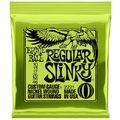Your use strings and pick?
Page 2 of 2: 12

Member
Posts: 22
Joined: 13 nov 2015
Interesting to read everyone's string preferences. Going back a few years I read that Eddie Van Halen used to boil strings to make them last longer. At that time, my own strings didn't last very long (the wound strings would quickly lose their brightness) and also the plain strings would tarnish. I decided to give the string boiling a try, and it did restore some of the twangy 'zing' to the wound strings but within a couple of days they had returned to their muted tone. Boiling the strings removes fatty deposits and dirt that has become trapped in the windings. It also neutralises the various acidic compounds that are released from our skin such as fatty acids, amino acids and propionic acid.
These acids cause corrosion of regular steel strings (but not stainless steel strings). With time, this corrosion affects the tone and intonation. Of course, the strings suffer from metal fatigue as part of the normal process of playing - even with careful cleaning, the strings do not live forever (although certainly some heavy gauge strings can last decades).
Although boiling gives a brief restoration of tone to the wound strings, it's just not practical - and if you don't dry the strings quickly afterwards the moisture will start some corrosion... So, how can we clean the dirt and neutralise acids easily ?
There are products that we can buy, but there are also effective methods using ordinary products that most people have. Take a damp micro-fibre cloth and rub a small amount of shower gel into it. Now, pinch the cloth around each string and wipe up and down the full length of each string. This will take care of the grease and acidic compounds. Carefully wipe over the strings with a clean cotton cloth (but don't press down hard on the strings).
Something else I do to extend string life is to try and play with clean hands.
I haven't bought any plectrums for around 20 years. They are so easy to make from old bank / credit cards, although they will need some smoothing with a fine file or wet and dry paper. You can make your own custom pick shapes if you find the right cards :)
These acids cause corrosion of regular steel strings (but not stainless steel strings). With time, this corrosion affects the tone and intonation. Of course, the strings suffer from metal fatigue as part of the normal process of playing - even with careful cleaning, the strings do not live forever (although certainly some heavy gauge strings can last decades).
Although boiling gives a brief restoration of tone to the wound strings, it's just not practical - and if you don't dry the strings quickly afterwards the moisture will start some corrosion... So, how can we clean the dirt and neutralise acids easily ?
There are products that we can buy, but there are also effective methods using ordinary products that most people have. Take a damp micro-fibre cloth and rub a small amount of shower gel into it. Now, pinch the cloth around each string and wipe up and down the full length of each string. This will take care of the grease and acidic compounds. Carefully wipe over the strings with a clean cotton cloth (but don't press down hard on the strings).
Something else I do to extend string life is to try and play with clean hands.
I haven't bought any plectrums for around 20 years. They are so easy to make from old bank / credit cards, although they will need some smoothing with a fine file or wet and dry paper. You can make your own custom pick shapes if you find the right cards :)
SUPPORTER
Posts: 2090
Joined: 27 set 2014
LoBias wrote:Going back a few years I read that Eddie Van Halen used to boil strings to make them last longer.
I could never play as good as Eddie, but my string boiling was as good as his any day :D :D :D

Ernie Ball 2221 Regular Slinky Gitarrensaiten
Saitensatz für E-Gitarre

5,90 €
iThis widget links to Thomann, our affiliate partner. We may receive a commission when you purchase a product there.
Visit Shop

Member
Posts: 22
Joined: 13 nov 2015
I think I could have out-boiled him on the saucepan... but that's all :)
Talking of 'refreshing' strings I recall some player who would put old strings in a jar of spirits - maybe meths or white spirit. These are highly inflammable of course so it has some risk attached. An excellent way of degreasing strings and fretboard is to use naptha (lighter fuel). Again, it's not to be used near any source of igintion, but it is very effective and evaporates quickly. It doesn't harm guitar finish such as poly or the traditional cellulose finish that Gibson apply.
Naptha is a constituent of WD40 which makes it a good degreaser. WD40 has a small amount of oil added, and if you spray a little on a soft cloth it is a very effective string cleaner and corrosion inhibitor.
People will say "Oh no, I don't want a petroleum based product near my guitar !"
The fact is that almost every fretboard / string care method that you can buy contains petroleum distillates - even the so-called lemon oil (no real lemon substance is in it). Even the aroma of lemon is synthesized from pine trees...
Talking of 'refreshing' strings I recall some player who would put old strings in a jar of spirits - maybe meths or white spirit. These are highly inflammable of course so it has some risk attached. An excellent way of degreasing strings and fretboard is to use naptha (lighter fuel). Again, it's not to be used near any source of igintion, but it is very effective and evaporates quickly. It doesn't harm guitar finish such as poly or the traditional cellulose finish that Gibson apply.
Naptha is a constituent of WD40 which makes it a good degreaser. WD40 has a small amount of oil added, and if you spray a little on a soft cloth it is a very effective string cleaner and corrosion inhibitor.
People will say "Oh no, I don't want a petroleum based product near my guitar !"
The fact is that almost every fretboard / string care method that you can buy contains petroleum distillates - even the so-called lemon oil (no real lemon substance is in it). Even the aroma of lemon is synthesized from pine trees...
Member
Posts: 374
Joined: 25 mar 2012
Maybe a little off topic but i didn't want to start a new thread.
Has anybody any experience with [url=http://www.thomann.de/se/thomastik_ac112.htm] Thomastik Plectrum [/url]. Here is [url=https://www.youtube.com/watch?v=VbcJBkwwzoU] nice demo [/url]. But i want to know more since changing strings involves som delicate adjustments on a pleked guitar.
Also has anybody tried [url=http://www.thomann.de/se/thomastik_pj116.htm] Thomastik John Pearse strings [/url] on a nylon string? Here is [url=https://www.youtube.com/watch?v=NLDk-NncMOQ] another demo from Joe Gore [/url] Fantastic!
Has anybody any experience with [url=http://www.thomann.de/se/thomastik_ac112.htm] Thomastik Plectrum [/url]. Here is [url=https://www.youtube.com/watch?v=VbcJBkwwzoU] nice demo [/url]. But i want to know more since changing strings involves som delicate adjustments on a pleked guitar.
Also has anybody tried [url=http://www.thomann.de/se/thomastik_pj116.htm] Thomastik John Pearse strings [/url] on a nylon string? Here is [url=https://www.youtube.com/watch?v=NLDk-NncMOQ] another demo from Joe Gore [/url] Fantastic!
Member
Posts: 89
Joined: 14 giu 2011
I play Ernie Ball Power Slinky 55 - 110 on most of my basses.
Pick...? What is a pick? :D
Pick...? What is a pick? :D

Member
Posts: 22
Joined: 13 nov 2015
[quote]nilton wrote:
Maybe a little off topic but i didn't want to start a new thread.
Has anybody any experience with [url=http://www.thomann.de/se/thomastik_ac112.htm] Thomastik Plectrum [/url]. Here is [url=https://www.youtube.com/watch?v=VbcJBkwwzoU] nice demo [/url]. But i want to know more since changing strings involves som delicate adjustments on a pleked guitar.
Nilton, it seems that buying a set of these strings would involve a 'leap of faith'. I would be concerned about making changes to a finely set-up instrument to suit a particular string that may not be to your liking. It would be nice to try a guitar with these strings already fitted, but of course such a guitar could possibly be constructed differently to yours and therefore respond very differently tonewise.
The lower tension is claimed to be an advantage for older guitars that may have suspect bracing and that is a fair point to make. On a modern instrument in good condition, the lower tension might not be so advantageous - although lower tension would assist in making the guitar easier to play. Lower tension means that the intonation will certainly need adjusting.
Maybe a little off topic but i didn't want to start a new thread.
Has anybody any experience with [url=http://www.thomann.de/se/thomastik_ac112.htm] Thomastik Plectrum [/url]. Here is [url=https://www.youtube.com/watch?v=VbcJBkwwzoU] nice demo [/url]. But i want to know more since changing strings involves som delicate adjustments on a pleked guitar.
Nilton, it seems that buying a set of these strings would involve a 'leap of faith'. I would be concerned about making changes to a finely set-up instrument to suit a particular string that may not be to your liking. It would be nice to try a guitar with these strings already fitted, but of course such a guitar could possibly be constructed differently to yours and therefore respond very differently tonewise.
The lower tension is claimed to be an advantage for older guitars that may have suspect bracing and that is a fair point to make. On a modern instrument in good condition, the lower tension might not be so advantageous - although lower tension would assist in making the guitar easier to play. Lower tension means that the intonation will certainly need adjusting.
Member
Posts: 374
Joined: 25 mar 2012
LoBias, I am aware of all those facts and also that string tension affects the resonance frequency of the top. That is the reason i had to change from a .056 to a .053 for the E-string (and a brass peg) in order o improve bass response. The guitar is fully playble with a .013 set thanks to the strandberg endure neck and the plek setup. So my goal here is to improve sound, not playbility (that can always be fixed). The guitars design is based on (and nearly identical, even soundwise) a pre-war martin OM. I have some idea that the thomastik strings are more like strings from that era
Page 2 of 2: 12
Le jamsession online di wikiloops sono disponibili con il gentile
sostegno di:

Wikiloops is a great idea, well executed and deserves support - come on guys, support it - you don't expect to get anything good for nothing!
flythorn